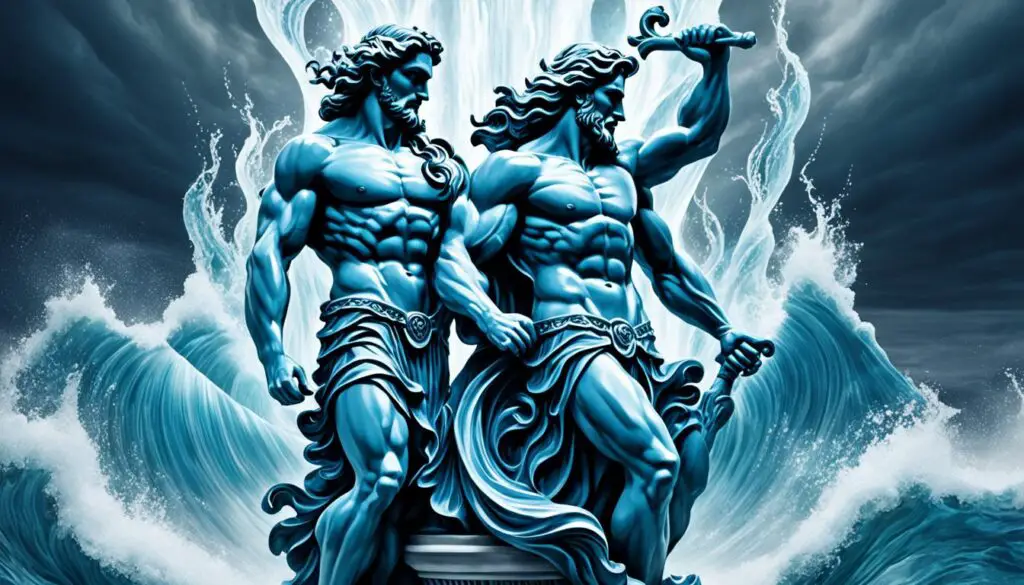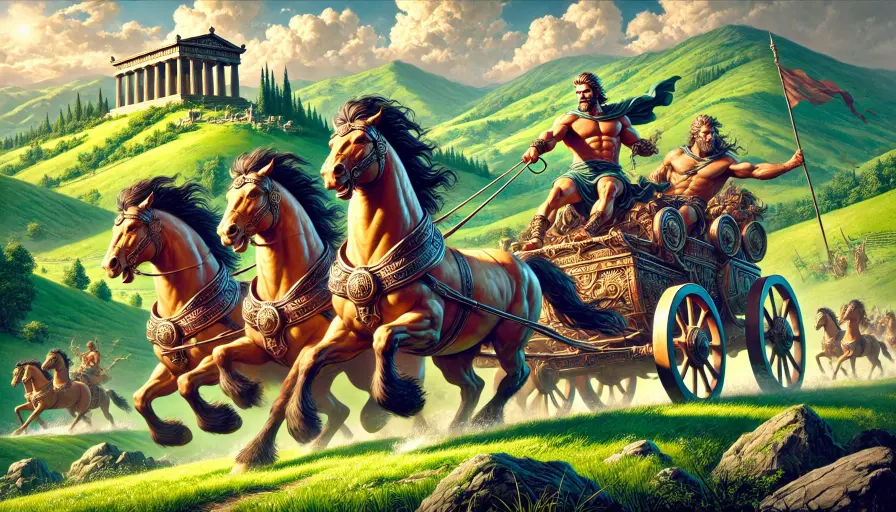Pelops is a key figure in Greek mythology, honored as a king in Pisa, in the Peloponnesus region. This area took its name from him.
He was born to Tantalus and Dione. Pelops represented grandeur with links to the divine and thrilling stories, such as his return to life.
Pelops became a revered figure at Olympia. His stories and strong presence influenced the beginning of the Olympic Games. They stood for a coming together of all Hellenes.
Key Takeaways
- Pelops was venerated at Olympia, contributing to the founding myth of the Olympic Games.
- He had numerous offspring, including notable figures like Atreus and Thyestes.
- Various accounts detail Pelops’ parentage, highlighting his divine connections.
- Pelops married Hippodamia after winning a challenging chariot race.
- He sought Poseidon’s aid, receiving divine assistance to secure his victory.
The Origins of Pelops: From Myth to Legend
Pelops is a well-known figure in Greek myths, his story is full of adventures and family traditions.
He’s tied to important mythological figures, making him a key part of the Pelops lineage.
The Birthplace and Early Life of Pelops
Pelops came from Tantalus and a few different mothers, so his beginnings have many stories.
People said he was born in areas showing his noble blood like Phrygian and Lydian.Arcadian.
When he was young, Pelops left his birthplace to travel to Greece. Here, he fought his way to becoming king of Pisa.
Parental Lineage: The Influence of Tantalus and Dione
The story of Tantalus and Pelops mixes horror and divine actions. Tantalus made a terrible mistake by serving Pelops to the gods at a feast.
Despite this, Pelops was brought back to life by the gods, showing the mix of their power and human actions.
His noble background came from Dione, his mother (or possibly Euryanassa, Eurythemista, or Clytia).
Pelops’ Abode and Kingdom
In Greece, Pelops’ courage and luck helped him become the king of Pisa. He reigned over Pisa in Elis and became the namesake of the Peloponnesus peninsula.
Pelops’ influence didn’t stop there; he had many children, like Atreus and Thyestes. They spread his name even further.
He even had an impact on the Greek landscape by having islands named after him.
The Tragic Banquet: Pelops’ Sacrifice and Resurrection
At Tantalus’ feast, the horrifying story of Pelops began. Tantalus, the king, offered his son as a meal to test the gods’ wisdom.
However, the gods saw through his plan and were not fooled.
Tantalus’ Deceptive Feast
The tale of Tantalus’ banquet is a dark one in Greek myths. Once honored among the gods, he aimed to win even more of their favor.
This led him to feed his son, Pelops, to them. The gods, offended, were quick to realize this deceit.
The Rebirth of Pelops and the Role of Demeter
To right this wrong, the gods instructed Hermes to gather Pelops’ body parts. He did so, with Demeter the only one to eat apart.
Her heavy heart over losing her daughter led her to mistakenly eat Pelops’ shoulder. Yet, the gods showed grace and brought Pelops back to life.
This story speaks of both punishment and forgiveness from the gods.
The Ivory Shoulder: A Divine Replacement
Hephaestus, the god of smithing, created an ivory shoulder to replace Pelops’ lost one. This divine act symbolizes Pelops’ new life.
It also stands as a reminder of the gods’ compassion and power, mixing themes of suffering and rebirth in the myth.
Who Was Pelops? The Hero’s Legacy in Greek Mythology

Pelops is a key name in Greek myth. His story is filled with feats and connections to gods like Poseidon.
These elements make his tale rich and engaging.
The Significance of Pelops’ Name
Pelops’ name might mean “dark-faced.” This hints at deep ties between his story and the lands he touched.
His life was full of twists and turned into mysteries.
He got special gifts from Poseidon and won big events. This included a famous race. His story mixes divine help with his efforts, a common Greek myth theme.
The Impact of Pelops on the Peloponnesus
Pelops left a huge mark on the southern Greece region named after him. His legacy isn’t just in stories but shaped real places and culture in Ancient Greece.
He organized the first Olympic Games and ruled in Pisa. These efforts show his big role in history.
The games he started became the Olympics we know today.
His line kept his legacy alive. Figures like Atreus and Agamemnon kept Pelops’ themes of divine help and hardship going.
They show how far Pelops’ impact reached, even through family tales.
The Chariot Race: Winning Hippodamia
Pelops wanted to win over Hippodamia in a Greek myth known for its excitement. His quest needed lots of courage and clever planning.
The Challenge Set by King Oenomaus
King Oenomaus, Hippodamia’s father, set a challenging race. It was a life or death situation: win the race and marry Hippodamia, or lose and face death.
Many had tried and died before, making this a dangerous game.
Myrtilus and the Betrayal
Kpelops knew he had to be smart to win the race. He made a deal with Myrtilus, Oenomaus’ charioteer.
Myrtilus helped by making the chariot faulty, causing Oenomaus to die in the race. This deceit led to his tragic end and a curse on Pelops’ family.
The Victory and Marriage to Hippodamia
After Oenomaus died, Pelops was the winner. He married Hippodamia and had many children.
Some of their children, like Atreus and Thyestes, became key figures in Greek stories. Despite the curse, Pelops and Hippodamia started a legendary family.
This tale highlights the drama and twists of ancient myth. It shows how intertwined the destinies of these characters were.
Their stories not only inspired early Greek myths but also influenced later tales and even the Olympics’ history.
Pelops and Poseidon: The Divine Connection

The special bond between Poseidon and Pelops was full of affection and blessings. Poseidon, the sea god, closely watched over Pelops.
He granted him amazing gifts and advice, shaping Pelops’ fate.
The Affection of Poseidon
Poseidon showed his love for Pelops by giving him precious gifts. The most famous was a chariot with wings, pulled by unbeatable horses.
This wasn’t just about gold and rare items. It showed a deep bond of mentorship. Poseidon guided Pelops through his toughest journeys.
Charioteer Training and Gifts from Poseidon
Poseidon went beyond mere gifts. He also taught Pelops how to be an excellent charioteer. This preparation was key for a big race against King Oenomaus.
Thanks to Poseidon’s help and hard work, Pelops was able to win the race. He also won Hipppodamia’s love.
Both Poseidon’s support and the charioteer training were vital. They helped Pelops achieve legendary success.
His story is proof of the power of divine influence.
The Cursed Lineage: Myrtilus’ Revenge

The legacy of Pelops changed for the worse after Myrtilus placed a curse on the family. This revenge set off a series of tragedies for Pelops’ descendants.
The House of Atreus, marred by betrayal and revenge, became the focus of this cursed lineage.
The Curse of Pelops’ Descendants
After Myrtilus helped Pelops win a chariot race and was betrayed, he cursed Pelops.
This Myrtilus curse brought nothing but hatred and misfortune for generations. For example, Pelops’ sons, Atreus and Thyestes, found themselves in a terrible rivalry.
One key event was when Atreus killed Thyestes’ sons and fed them to their father.
The Impact on the House of Atreus
Owing to Myrtilus’ curse, the House of Atreus faced immense suffering and death. Atreus, seeking revenge, killed Thyestes’ children.
This act only led to more bloodshed. Finally, Aegisthus, Thyestes’ son, killed Atreus and took Mycenae’s throne.
Yet, this violence didn’t stop. Agamemnon, Atreus’s son, later died at the hands of his wife, Clytemnestra, and Aegisthus.
Orestes, Agamemnon’s son, then killed them to avenge his father. The curse kept affecting the family until they begged Athena for mercy.
The cursed lineage of the Atreides stands as a grim lesson in facing the results of past wrongs.
This tale conveys ancient Greek ideas about inherited guilt and the need for clear miasma with acts of repentance.
Pelops’ Descendants: A Powerful Dynasty
Pelops’ children started a strong dynasty known in Greek myths. Important people like Atreus and Thyestes were his descendants. These two brothers had a story full of fights and sadness that became a big part of ancient Greek myths.
Notable Offspring: Atreus, Thyestes, and Others
Atreus and Thyestes were Pelops’ sons and key characters in Greek myths. They had a very hard relationship with betrayal, eating human flesh, and getting back at each other.
Atreus became the king of Mycenae with Zeus’ sign but lost the throne to Thyestes.
Orestes, Atreus’ son, also had a tough life. He lived in Phocis with King Strophius for eight years.
When he grew up, he killed Aegisthus and his mom Clytemnestra with his friend’s help. This made him go crazy because of the Erinyes (Furies).
But Orestes also showed good and became someone important in the end. He went to trial in Athens and Athena found him not guilty.
Then he married Hermione and became king of several places. Unfortunately, he died from a snake bite in Arcadia.
The Connection to the House of Perseus
The link between Pelops and Perseus is key to understanding Greek myth. The marriages between their families moved power from Perseus’ family to Pelops’.
This way, the many stories of these families were woven together, adding to the Pelops dynasty’s fame.
This brought us the Achaeans, a group said to be linked to Perseus’ sons. Their connection to the Danaans and their shared past with Pelops’ family shows how all these myths came together.
This made Pelops’ dynasty have a big and lasting influence.
The Cult of Pelops and the Origin of the Gallant Olympic Games
The Cult of Pelops showed a strong love for the hero in Olympia. His honor was very important for starting the ancient Olympic Games.
People did special ceremonies nightly at his place. These helped connect Pelops to the start of famous sports worldwide.
Pelops’ Veneration at Olympia
People in Olympia deeply respected Pelops. They found his remains and did special rituals around him.
At the sacred area called Altis, his shrine stood. Pausanias talks about these rituals, including night prayers and a place just for him.
Their acts honored not just a myth but also admired his values and the hero he was.
The Role of Pelops in Founding the Olympic Games
Pelops was key in starting the Olympic Games. It’s said the games were first held in 776 BC in his honor at Olympia.
Winners were given olive branches. It wasn’t just a prize; it linked them to Pelops and symbolized unity.
Pelops’ role as a founder was celebrated in historical records, and his legacy continues even today with the modern Olympics.
Conclusion
Looking back at Pelops’ story offers deep insights into Greek mythology. This book focuses solely on Pelops, which changes how we see this important figure’s myths.
It also looks at his connection to Zeus at Olympia.
The book is split into three parts with seven chapters. Each part explores a different aspect of Pelops’ life and myths.
We learn about his rough childhood, his important marriage, and the start of the Olympic festival.
Chapter Four dives into art and archaeology, asking where Pelops’ cult began. Later chapters discuss his story’s influence on language, locations, and art today.
The book makes a strong case for Pelops’ long-lasting importance.
Pelops’ myth highlights themes like ambition, pride, and deceit. These themes have inspired many stories and cultural references.
They make Pelops a key figure in Greek mythology.
This detailed exploration shows Pelops’ enduring impact. “Who Was Pelops? Greek Mythology’s Legendary Hero” ensures his place in the rich tapestry of Greek myths.




